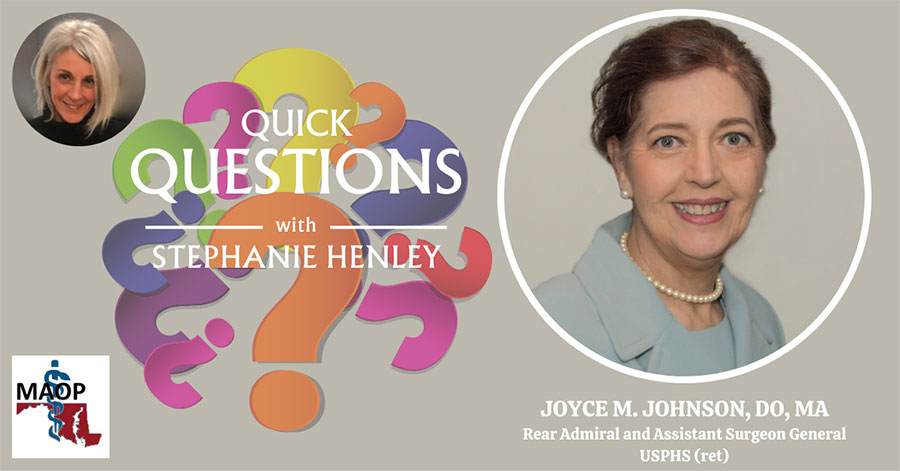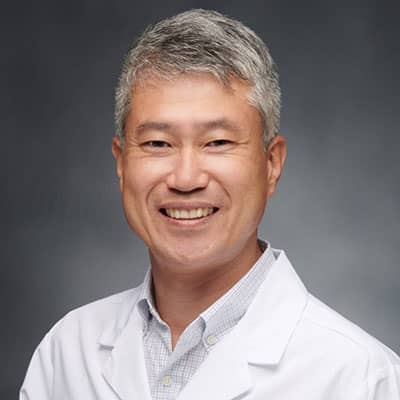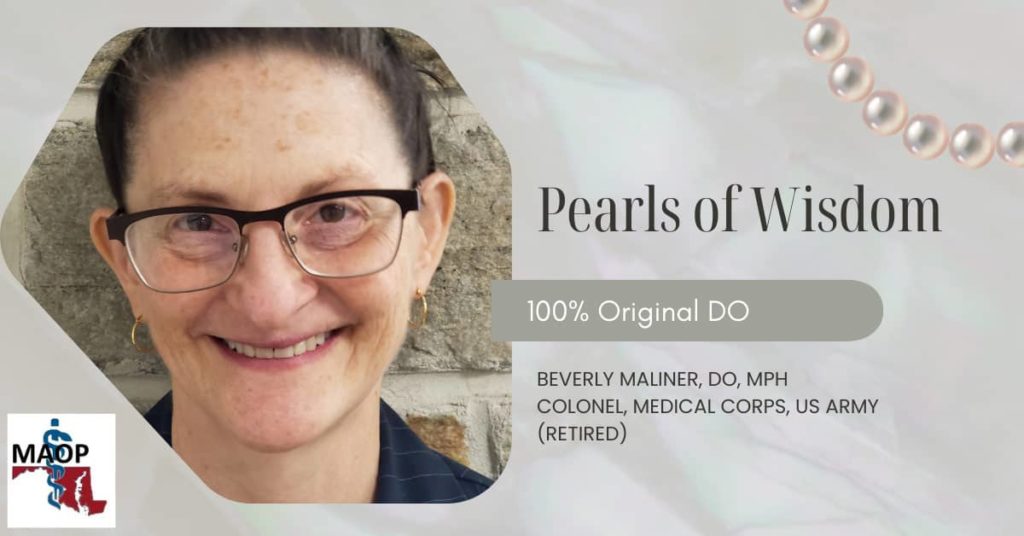Joyce M. Johnson, DO, MA
Rear Admiral and Assistant Surgeon General, USPHS (ret)
Q: What’s something people would be surprised to know about you?
The reason I have so much energy is that I sleep a lot – at least 8 hours a night.
Q: How did you make your first dollar?
From around the age of 8 until I went to college, I had a vegetable stand at the end of our block. Our family had a large garden in our back yard, and I would sell the extra produce. I loaded the vegetables in my red wagon, wheeled it to the end of the block, put up a sign, and set up business. Pumpkins were the mainstay, but also included were other garden vegetables such as tomatoes and cucumbers.
Q: Name a place in the world you want to see.
I’ve been fortunate to have traveled and worked on every continent, and much of my work now focuses on the Arctic and Antarctic with the National Science Foundation.
The one place I would like to go is Komoto Island – I find the Komoto dragons fascinating. I was at the National Zoo in Washington, DC, during feeding time – one dragon ate a 5 pound raw roast in one bite!
Q: The best show you’ve binged in the last two years?
Rarely watch TV – don’t even have a show I watch regularly.
Q: How do you take your coffee? How many a day?
I rarely drink coffee, and when I do it’s always decaf. The tiniest bit of caffeine keeps me awake for a long time – I’m probably a slow metabolizer of caffeine. (Yes, that is a genetic variant.)
Q: If you could have a conversation with your younger self, what advice would you give?
To try to distinguish between what matters and what doesn’t. It’s not always easy to do, but there is a tendency to invest a lot of anxiety into things that don’t matter.
Q: What did you want to be when you were growing up?
First, I wanted to be ballerina but I had no aptitude for music or dancing, so I recognized that wasn’t realistic. (And that’s even before I realized how much practice and dedication it would take.) I went to college wanting to be a cooking teacher – but on the first day learned they didn’t have a home economics program. Thus, I became a bio major, then earned a master’s degree in hospital administration and finally went on to medical school.
I should add, though, that while a graduate student I was able to teach cooking to night students at the local community college. First, I taught European cooking. Then they needed someone to teach microwave cooking – when microwaves were still an expensive luxury item. They sent me to learn from Amana, the primary manufacturer at the time. The class was challenging to teach. The students were all women who hated to cook. Their husbands had just spent a fortune on the microwaves and had unrealistic expectations – they expected gourmet meals to “magically” happen in the microwave. The women had similar expectations, and didn’t want to do any cooking. One student complained vehemently when she had to cut the vegetables. Not a fun class. However, I was also sent to “crock pot” school so I could teach “Camping with a Crock Pot.” The idea was to assemble the dinner in the crock pot and to cook it while off in the woods. The class was fun but perhaps a little unrealistic. Plugging in a crock pot all day at a campsite can be challenging – the only outlet is often in the rest room. I’m not sure I’d want my crockpot in the rest room all day.
Years later, as a physician and Director of Health and Safety (“surgeon general”) of the U.S. Coast Guard, my culinary interests were useful. My job included responsibility for the Coast Guard’s cooks. One year, at a national joint-services meeting, I lectured on the “History and Science of Chocolate” that included the 100+ participants molding chocolate clay, cocoa painting on cookies, and making chocolate bowls with balloon molds. I still give a variation of that lecture today.
Q: Beach or mountain vacation?
Neither one. I prefer adventures. My favorite vacations have involved volunteer medical work in remote places – Philippines after a major typhoon, St. Croix, US Virgin Islands as a Red Cross disaster worker after two major hurricanes, Indonesia with Project Hope, etc. As a family we have gone on several DoCare missions to Guatemala and Peru.
On one family vacation to New Orleans, we stopped at Carville to visit the hospital for leprosy patients. It was a very large, very old building. The patients had adult-sized three-wheeled tricycles to go from place to place within the building. We spent a day with one of the patients who had been there for decades – he shared a lot of his life story with us. He was a remarkable person, who accepted his fate without anger. (My son often says, though not necessarily complaining, “While other kids were going to Disneyland on vacation, my parents took me to a leprosy hospital…”)
Q: Favorite or most-used app?
I use as few apps as possible – try to keep things simple.
Q: If you could have any superpower, what would it be?
I’d just be happy with a better memory.
Q: What’s the greatest lesson you’ve learned so far in your life?
To be grateful when I’m able to combine something fun with something worthwhile.
There’s value in being both a generalist and a specialist – in medicine and life in general.
Q: What’s the greatest challenge you’ve ever had to overcome?
To accept my limitations…and then to be grateful for all that I have.
Q: What would be your last meal?
It probably wouldn’t matter – I wouldn’t remember it for long afterwards anyway.
Q: If you listen to only one song for the rest of your life on repeat, what would it be?
My preference would be silence – no song at all.
Q: One thing you couldn’t live without?
In my travels to remote areas, I’ve lived without most everything. The most important thing is common sense – and some say I live without it a lot….
Q: Ideal weekend?
Having nothing that needs to be completed by Monday.
Q: What four qualities in a significant other matter most to you?
Honesty; deserving of trust; sense of humor; appreciates good food but willing to eat anything I cook.
Q: How long have you been involved with MAOP?
I’ve been involved with MAOP for as long as I can remember.
Q: Why is it important to you to be part of your state osteopathic medical association?
In Maryland the state osteopathic medical association is extremely important because there are so few DOs. And, with the two new schools, it will be even more important with the new students as they learn to integrate into the osteopathic profession.



